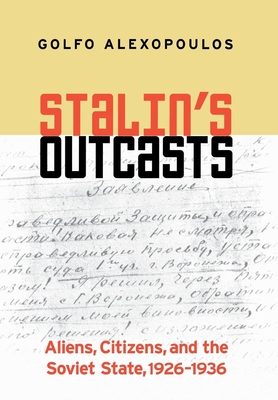

 Cornell University Press
Cornell University Press
Stalin's Outcasts: Aliens, Citizens, and the Soviet State, 1926-1936


Key Metrics
- Golfo Alexopoulos
- Cornell University Press
- Hardcover
- 9780801440298
- 9.12 X 6.42 X 0.86 inches
- 1.09 pounds
- Political Science > Civil Rights
- English
 Secure Transaction
Secure TransactionBook Description
I served not in defense of the bourgeois order, but only for a crumb of bread since I was burdened with five small children.From 1923 to 1925 I worked as a musician but later my earnings weren't steady and I quickly stopped. Without an income to live on, I was drawn to the nonlaboring path.As a man almost completely illiterate and therefore not prepared for any kind of work, I was forced to return to my craft as a barber.I am as ignorant as a pipe.Golfo Alexopoulos focuses on the lishentsy (outcasts) of the interwar USSR to reveal the defining features of alien and citizen identities under Stalin's rule. Although portrayed as bourgeois elements, lishentsy actually included a wide variety of people, including prostitutes, gamblers, tax evaders, embezzlers, and ethnic minorities, in particular, Jews. The poor, the weak, and the elderly were frequent targets of disenfranchisement, singled out by officials looking to conserve scarce resources or satisfy their superiors with long lists of discovered enemies.Alexopoulos draws heavily on an untapped resource: an archive in western Siberia that contains over 100,000 individual petitions for reinstatement. Her analysis of these and many other documents concerning class aliens shows how Bolshevik leaders defined the body politic and how individuals experienced the Soviet state. Personal narratives with which individuals successfully appealed to officials for reinstatement allow an unusual view into the lives of outcasts. From Kremlin leaders to marked aliens, many participated in identifying insiders and outsiders and challenging the terms of membership in Stalin's new society.
Author Bio
My current work examines the threads that connect twentieth-century Soviet and twenty-first-century Russian authoritarianism, especially in the dis/information space.
My most recent book, Illness and Inhumanity in Stalin’s Gulag, was published by Yale University Press in 2017. The work examines the system of violent human exploitation in the Stalinist forced labor camps, 1929-1953. It draws upon recently declassified archival materials from the Gulag health department to reveal how prisoners were fundamentally dehumanized and managed as commodities. Mortality was much greater than the official Soviet records indicate, as prisoners were routinely released on the verge of death. The book argues that human exploitation in the Stalinist camps was deliberately destructive and that the regime concealed the Gulag’s destructive capacity.
My first book, Stalin’s Outcasts: Aliens, Citizens, and the Soviet State, 1926-1936 (Cornell, 2003), examines Stalin’s disenfranchisement policy, and the lives and voices of those deprived of rights (lishentsy). At the center of the work is an analysis of over five hundred petitions to Soviet officials for the reinstatement of rights. I discovered these handwritten letters from social outcasts in a closed archive in western Siberia just months after the collapse of the Soviet Union. The book demonstrates how, from Kremlin leaders to marked aliens, many engaged in identifying citizens and non-citizens and challenging the terms of social membership in the Stalinist state.
Research Interests
Russia and the Soviet Union, Stalinism and authoritarianism, medicine/health and society, political violence and human rights, disinformation and security
Source: University of South Florida
Videos
No Videos
Community reviews
Write a ReviewNo Community reviews